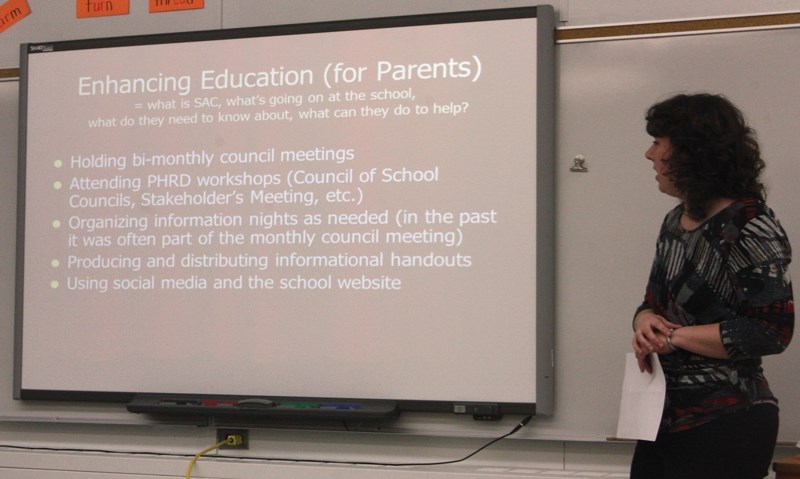The possible return of the Religious Studies course at Westlock Elementary School was one of the items discussed during principal Pierre Ouimet’s report to the Pembina Hills trustees during their Jan. 28 meeting.
Pembina Hills holds its second meeting of each month at a different school within the division — last Wednesday marked Westlock’s turn.
Ouimet, who served as principal at R.F. Staples School and moved over to WES this past September, said there were a lot of differences between the operation of a high school and a K-6 school. — recess, for instance.
What is similar, however, is the commitment to kids by staff, he said.
Ouimet said they have 555 students, with approximately 21 per cent of their kids (about 115 in total) enrolled in French Immersion.
He noted they have an unusually high number of students with special needs; for example, during a recent exam, roughly a third of all the students who wrote it needed accommodations of some kind.
“That’s a lot: a third of our students that needed some kind of support,” he said.
They have 34 teachers, representing approximately 30 full-time equivalent positions, along with 27 support staff.
The three main goals stated in their education plan is inclusive education, literacy and numeracy and supporting at risk students. Ouimet said the first two goals are fairly broad statements, but they have a number of strategies embedded in the education plan to accomplish them.
WES students generally score very well; the Grade 6 cohort results on Provincial Achievement Tests (PATs) were equal to the province and exceeded the provincial average in science, social studies and language arts.
The Grade 6 French Immersion class was also equal to the province in social studies and exceeded the province in other areas.
“The results for Grade 6 were quite good compared to the province,” he said.
Ouimet noted that WES took part in the piloting of Student Learning Assessments (SLAs) — an online examination that is taking the place of Provincial Achievement Tests. This year, the SLAs were rolled out to Grade 3 students.
Ouimet said the whole process was very frustrating, due in no small part to technical issues with government hardware, and the results simply weren’t very good.
That said, the staff took it as a pilot year and look forward to what it will look like next year, he indicated.
Board chair Kim Webster noted they had spoken with the education minister on this issue and he admitted that the rollout of the assessments went poorly this year. However, school divisions were still generally in favour of the new SLAs, at least in principle.
Ouimet closed out his presentation by alerting the board he would be polling parents about the potential return of a Religious Studies course.
Religious Studies was offered at WES for a number of years and basically educated students about the Bible — enrolment was voluntary.
Ouimet said the previous course died out during the last years of Terry Anderson’s principalship. Some parents are now pushing for its return; it might have been back last year, but it never materialized.
He said he will do a very thorough survey of parents to determine interest, noting that the course (and religion in general) can be a very polarizing topic.
“I just want to let (trustees) know that I’m going to take another run at that,” he said. “I have in my mind some certain thresholds we need to meet before I say we are doing this.”
WES parent advisory council chair Kathryn Quist also delivered a report on her group’s activities.
Quist said she started out in the role as school council chair last year and had to “figure out” her role and the role of the council itself.
Ultimately, she hit upon this mission statement: the role of the school council is to look for ways to enhance education and improve the school environment.
Quist said they use this principle to guide all of their activities, noting that they ask themselves with every event whether or not it actually strengthens the school.
Quist said the council meets several times a year; there used to be monthly meetings, but it got to be “too much.”
Their activities include organization information nights as needed and distribute information handouts on issues affecting the school.
She noted they recently developed a fact sheet regarding the School Resource Officer (SRO) which Pembina Hills is trying to establish; it has been fact-checked, but still needs to be sent out.
Quist said they also provide financial support for school activities and equipment for the school. For instance, they recently bought a dollhouse for the kindergarten class and four new desktop computers.
Under the header of “improving the school environment,” she said they recently purchased shovels for students to dig sand with and upkeep the Fox and Rocks Garden in front of the school.
Quist said they had a work bee last fall where they put new blocks into the garden.
In terms of improving the school environment “emotionally” the council hosts events like a welcome barbecue at the start of the year that proved immensely popular, as more than double the expected guests showed up.
They also host several pizza days and a staff appreciation luncheon. Last year, they hosted a “Pi Day” where they auctioned off pies made by the students; that event will be returning this March, though they will be calling it Carnival Hoopla.



